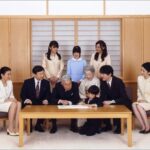The mother’s state of well-being is considered to be the most important “feng shui” for a family’s happiness.


Maternal negative energy can result from burnout
From a psychological perspective, women tend to strive for self-improvement more than men in ways that please others.
Simply put, mothers often take on more caring roles. In many cases, a mother’s body is worn out by the mundane tasks of childcare, and her spirit and mind are suppressed, resulting in a lot of negative energy.
However, children can sense their mother’s negative energy early on and are influenced by it.
In the movie “The Elegant Hedgehog,” the mother of Paloma, a young girl, suffered from depression for many years, constantly worrying her family.

Maternal negative energy can be a result of burnout.
Under her mother’s influence, Paloma felt that life was utterly empty at a young age and even made a drastic decision on her 13th birthday.
In another film, “Room,” a mother is imprisoned in a shed for almost seven years after being deceived by a neighbor. There, she gives birth to her son, Jack.
Fate played a cruel joke on her, but she did her best to give her son a happy childhood.
As her son grew up, he not only helped his mother escape their “room” but also helped her regain her confidence in facing the outside world.
Children absorb their mother’s emotions as they grow up. Therefore, it can be said that a mother’s emotions and state of mind significantly influence her child’s development.

A mother’s excessive sacrifice can hinder her child’s happiness
In the book “The Family Awakening,” it is written that children live in the present, while parents often focus on the future. This creates a significant gap between the children’s needs and the parents’ desires.
Children, with their innocent souls and boundless curiosity, usually want to control their lives, experiencing each present moment without being bound by future expectations.
However, many mothers try to control their children’s present, hoping that their decisions and rules will lead to a better future for their offspring. Mothers worry that their children might not reach their full potential, thus creating invisible pressure.

A mother’s excessive sacrifice can hinder her child’s happiness.
It’s not a matter of the mother being wrong or the child being wrong, but their needs are completely out of sync. While children want the freedom to explore and learn through real-life experiences, parents want to protect and guide them according to their standards of what is right.
This dynamic leads to the reality that a mother’s excessive sacrifice can impact both her and her child’s psychology. Putting too much pressure on herself to be perfect in her child’s eyes can make a mother feel burned out and cause the child to feel inadequate and unable to meet their mother’s expectations.

When a mother takes on multiple roles, the family may become imbalanced and distant
Whenever a mother takes on too many roles in a family, and the father is not sufficiently involved, there tend to be more conflicts and arguments.
When one side bears most of the responsibility while the other does not participate enough, this imbalance can lead to a sense of injustice and misunderstanding among family members.
The mother may feel burned out and unappreciated, while the father may feel that he doesn’t need to intervene or can easily shirk his responsibilities.
It is challenging for children growing up in such an environment to find happiness. Children often learn from what they see and experience.

When a mother takes on multiple roles, the family may become imbalanced and distant.
Witnessing the tension and disharmony between their parents, children may form misconceptions about how relationships should function.
Over time, the less involved a father is, the easier it becomes for him to do nothing. This passivity erodes the family’s relationships and connections.
Children need the presence and participation of both parents to develop emotionally. When a father is absent, children feel they are missing an essential part of their lives, leading to feelings of resentment or even anger.
Meanwhile, the mother will likely complain more, burdened by the heavy responsibility she carries.

A happy mother means a prosperous family
Professor Hong Lan, a psychology doctoral holder, once said, “A mother is the soul of a family.”
When a mother feels happy, the family thrives and is closely bonded.
The essence of family education is cooperation
There’s a saying, “Family education is about imparting the true value of love between parents.”
Therefore, the best education often comes when parents are of one heart and mind, working together to teach their children effectively. Unity in perspectives and methods of upbringing is crucial.
When parents share the same principles and values, children feel safe and stable in the family environment.
Nurturing children is the shared responsibility of both parents. Both play a significant role in shaping their children’s future.

A happy mother means a prosperous family.
Children are not the only meaning in a mother’s life
While raising children is one of the most important responsibilities a mother undertakes, her life also holds many other values and meanings.
Mothers have their own dreams, aspirations, and hobbies, and realizing that they are not just “mothers” but also “women” with various facets is essential for their holistic development.
When a mother solely focuses on childcare, it can lead to a sense of loss of self and a lack of fulfillment in life.
While the time and energy devoted to children are invaluable, mothers also need to allocate time for self-care and develop their personal interests.
These activities help mothers find happiness and serve as a model for their children about the importance of self-care and pursuing one’s passions.
The Three Signs: A Parent’s Guide to Child Wellbeing and Home Harmony
In the realm of feng shui, it is believed that a sudden negative change in a child’s behavior could be a reflection of disharmony in the home’s energy. As such, parents are encouraged to take a step back and re-evaluate the feng shui of their living space to restore balance and positively influence their child’s demeanor.
“The First Eight Years: Nurturing Your Child’s Character Development”
“Don’t worry if you can’t build a house yet; focus on building yourself first. Investing in self-improvement will save you a fortune in the long run, and the results will be well worth the wait. The first eight years of a child’s life are crucial, so parents must prioritize accompanying their children during this formative period.”




































